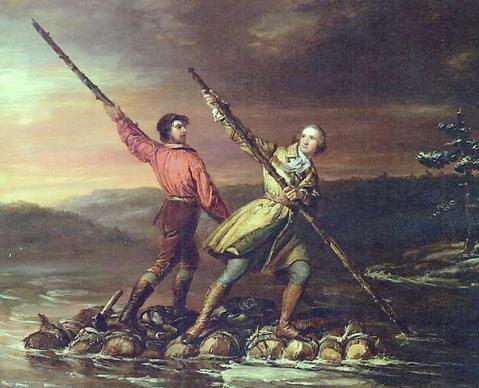Washington’s Providence
“I can with truth assure you, I heard bullets whistle and believe me there was something charming in the sound.” – George Washington in a letter to his brother, 1754
When we think of George Washington, we think of the stoic, chiseled in marble images on our money and adorning the walls of classrooms and museums. We have heard the stories of how he improbably took an undersupplied collection of volunteers and turned them into a fighting force that defeated the best army in the world. After the war, he presided over the Constitutional Convention and became the first President of the United States. We correctly place him on a pedestal. After all, he is the father of our country.
But what if Washington had not survived to lead the American Revolution or what if he had been killed during the Revolution? What would our world look like and how would American history have been shaped?
Many authors and historians have tackled these questions. They’re fun to think about because the danger has passed. I even attempt to answer some of these questions in my upcoming novel, Washington’s Providence (yes, shameless plug). Being a history geek, I’ve always been fascinated by the numerous near misses that came to shape Washington’s life. I would like to examine three of Washington’s near misses and try to make sense of what could have happened if any of them came true.
Today, let’s look at one.
In 1753, a twenty-one year old George Washington was appointed by Virginia Governor Robert Dinwiddie to deliver a message from King George II of England to the French garrison at Fort Le Boeuf near Lake Erie. The message was simple: The French were building forts on English soil and they had to leave. The area of contention was in present-day Ohio, and both the English and French had laid claims to it. Interestingly enough (and not surprising), Governor Dinwiddie was also a stock holder in the Ohio Company, a Virginia-based land speculation company interested in the profitable fur trade and real estate of Ohio.
Why would a twenty-one year old be sent to negotiate with the French army? There are a few reasons. First, Washington was a trained surveyor and seasoned traveler through the western wilderness of Pennsylvania and Ohio (lands claimed by Virginia in those days). He had already made similar journeys and was young and healthy enough to survive the harsh conditions of an Ohio winter. He was also known for being a mature and model youth. Most likely, he was appointed for the same reason most political appointments happen––he was well-connected. Two of his brothers also happened to be members of the Ohio Company.
Washington led his eight-man party to meet the French and deliver the message. The French garrison commander politely received the message, refused to leave, and sent Washington on his way. During the return trip to Virginia, Washington and one of his guides, Christopher Gist, went ahead of the others to return to Virginia as fast as possible and alert the governor of the French response. After losing their canoe to icy river rapids, Washington and Gist trudged along until they arrived at Murdering Town* (near Evans City, about thirty miles north of Pittsburgh). There, they met an Indian guide who agreed to show them the fastest route to the forks of the Ohio River.
The Indian led the weary travelers for a few miles. Suddenly, the Indian guide scrambled ahead to a small clearing, turned and fired his musket at Washington at point-blank range (about 15 feet)––and Missed. Gist apprehended the Indian and was about to kill him when Washington stopped him. After dark, they released the Indian, but fearing his return with reinforcements, they traveled through the night hoping to find safety.
Had the Indian not been such a poor shot, the name George Washington might only be a small footnote in our history books––but what would “our” history books look like? Would there even be a United States if it wasn’t for George Washington? How important was he to the American cause?
Next Week: We’ll look into two more of Washington’s near misses. In the meantime, what are your thoughts on Washington? What do you think would have happened if Washington didn’t lead the American Revolution?
* Note to self: If I’m ever traveling and come across a place called, Murdering Town, move on.
